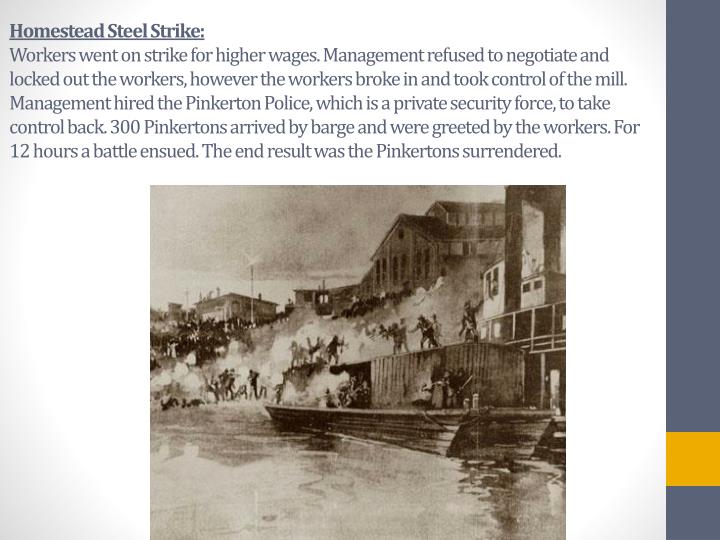

HOMESTEAD STRIKE CAUSE AND EFFECT FULL
The philanthropic Andrew Carnegie conveniently retired to his castle in Scotland, and Frick took full charge of the situation. The current agreement was about to expire, and the workers presented a new wage schedule, calling for an increase because of the higher market prices and enlarged output of the mills. Wages were arranged between the company and the union, according to a sliding scale based on the prevailing market price of steel products.

Its largest mills were in Homestead, near Pittsburgh, where thousands of workers were employed, their tasks requiring long training and high skill. The Carnegie Company had practically a monopoly of it and enjoyed unprecedented prosperity. The high tariff on imported steel had greatly boomed the American steel industry. Frick was also the owner of extensive coke-fields, where unions were prohibited and the workers were ruled with an iron hand. It was particularly significant that Andrew Carnegie, its president, had temporarily turned over the entire management to the company’s chairman, Henry Clay Frick, a man known for his enmity to labour. The Carnegie Company, on the other hand, was a powerful corporation, known as a hard master. It was one of the biggest and most efficient labour bodies of the country, consisting mostly of Americans, men of decision and grit, who would assert their rights. News from Pittsburgh announced that trouble had broken out between the Carnegie Steel Company and its employees organized in the Amalgamated Association of Iron and Steel Workers.

In this excerpt from her autobiography, Living my Life, radical Emma Goldman described how fellow radical Alexander Berkman decided to murder Frick during the Homestead strike. Known for his uncompromising and cruel tactics, Frick became an obvious target for labor activists looking to make a statement during the protracted strike. Henry Clay Frick, chairman of the Carnegie Steel Company, was demonized by labor for his role in the violent Homestead strike in 1892 in which a pitched battle was fought between strikers and company-hired Pinkerton detectives. “I Will Kill Frick”: Emma Goldman Recounts the Attempt to Assassinate the Chairman of the Carnegie Steel Company During the: Homestead Strike in 1892 by Emma Goldman


 0 kommentar(er)
0 kommentar(er)
